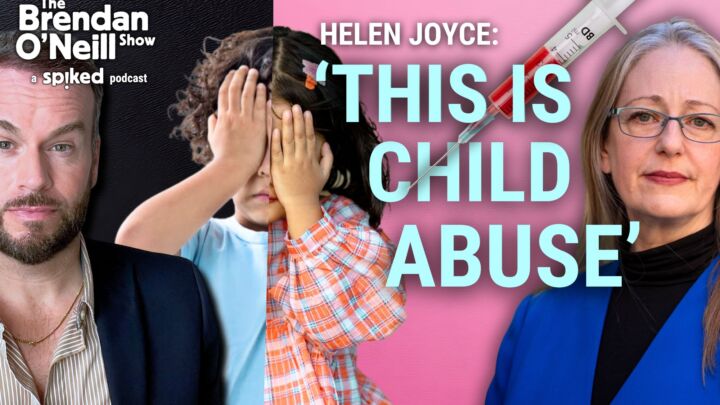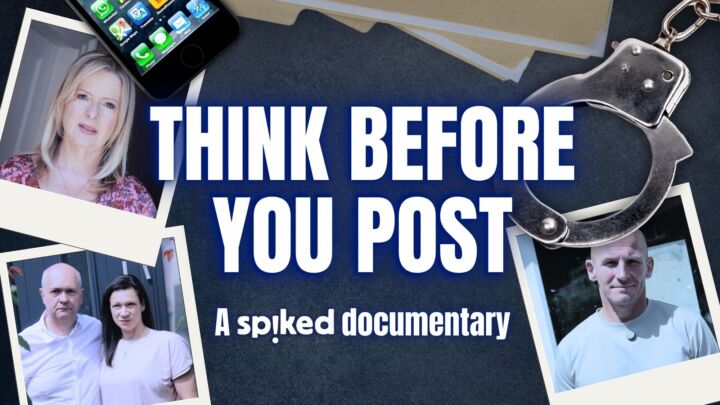The smear campaign against the Cass Review
Trans activists are still refusing to reckon with the harms of so-called gender-affirming care.

Want unlimited, ad-free access? Become a spiked supporter.
The Cass Review has delivered a damning indictment of the NHS’s treatment of gender-confused children – and of the ideology that has led so many youngsters to medically transition, causing them irreversible harm in the process. Unsurprisingly, ever since it was released last week, trans activists have been desperately scrambling to try to discredit its findings.
Using cool-headed research and hard data, Dr Hilary Cass’s final report on gender-identity services in England makes it clear that puberty blockers often don’t help children suffering from gender dysphoria. She argues that young people should not be rushed into receiving cross-sex hormones or so-called sex-reassignment surgeries. She even writes that ‘social transitioning’ alone – that is, adopting a name, pronouns and dress of the opposite sex – can be harmful for kids.
So how have trans activists tried to refute the report’s findings? Largely by misrepresenting or misunderstanding what Cass and her team have actually written. The trans lobby immediately denounced the review, claiming that it ignored any research that shows medical transitioning can be helpful to children. These arguments have since been repeated across social media and used as neat ‘gotchas’. But they seem to miss the point of the Cass Review entirely.
One of the most common claims doing the rounds is that the review ‘discarded’ 101 out of 103 clinical studies on gender-identity treatment. Supposedly, this shows that Cass was simply cherry picking the evidence that best fit her alleged ‘anti-trans narrative’. But as science writer Benjamin Ryan points out, this just isn’t true. Yes, some studies were given more weight than others in Cass’s conclusions. But only because these studies were of a higher quality. Even then, she doesn’t simply throw the low- and moderate-quality studies out. She even cites these papers to make the point that more studies are needed – particularly in researching the effects of cross-sex hormones on fertility. This wasn’t the result of cherry-picking. It is a reflection of the fact that existing research into childhood transitioning is incredibly weak.
It’s also worth noting that the concept of a ‘high-quality study’ is not some subjective decision made by Cass or her team. There are official scoring classifications to rank how reliable research might be. Perhaps unsurprisingly, it turns out that a concerning number of studies about trans healthcare are on the lower end of that quality scale. Hence Cass’s conclusion that there is no good evidence that prescribing puberty blockers or cross-sex hormones to kids is good for their long-term health or wellbeing, while there is plenty of evidence that they cause considerable harm.
This is what critics of the Cass Review repeatedly seem to miss – that there simply isn’t that much high-quality research into children who transition, despite trans activists’ claims that medical transitioning is ‘overwhelmingly’ backed by science.
Another similar argument against Cass claims that her review ignored all studies about paediatric gender-transition treatment that weren’t randomised controlled trials. After doing some digging, however, Ryan found that this claim originated from a post made by trans activist and attorney Alejandra Caraballo on X. Caraballo’s post included a screenshot of what looked like a literature review from the Cass Review. Only it wasn’t. This was actually a screenshot taken from a totally different report, published in 2020. Caraballo even posted this misinformation before the Cass Review had been released.
Although they have been thoroughly debunked, these misleading claims continue to be repeated by high-profile gender ideologues. Left-wing singer turned trans fanatic Billy Bragg boldly declared there are ‘plenty of data’ in favour of transitioning kids, but Cass just chose to ignore them. As did the insufferable Guardian columnist, Owen Jones, in a video ironically titled ‘The Cass Review and the Truth About Trans Health Care’.
In his video, Jones also accuses Cass of paying undue attention to the plight of ‘detransitioners’ – people who regret having transitioned, usually at a young age. Jones claims that the low rate of detransitioning (supposedly just one per cent of those who transition) means that we need not get so hung up on trans regret. Essentially, we should just ‘affirm’ children now and ask questions later, if ever. But, as is raised in the Cass Review, there are so few follow-up studies on young people who transition that the true number of detransitioners is almost certainly much higher. In trying to get a hold of this data from the NHS’s adult gender-identity services, Cass faced endless resistance. All but one of England’s adult gender clinics refused to cooperate.
So much of the criticism surrounding the Cass Review accuses it of setting the bar too high for gender medicine and of arbitrarily discounting research. But herein lies the problem. In a statement defending Cass’s findings, editor in chief of the BMJ Kamran Abbasi writes: ‘Studies in gender medicine fall woefully short in terms of methodological rigour; the methodological bar for gender-medicine studies was set too low.’ In other words, the case for ‘gender-affirming care’ has always been built on shaky ground. This is precisely what the Cass Review has exposed. It is a charge that is unanswerable.
Of course, the Cass Review was never going to win around the zealots. But it really ought to persuade the reasonable majority that ‘gender-affirming care’ has always been a dangerous experiment. Cass has exposed just how flimsy the arguments of the trans activists really are. Their smear campaign against it must not succeed.
Lauren Smith is a staff writer at spiked.
Picture by: Getty.
You’ve read 3 free articles this month.
Support spiked and get unlimited access.
Support spiked – £1 a month for 3 months
spiked is funded by readers like you. Only 0.1% of regular readers currently support us. If just 1% did, we could grow our team and step up the fight for free speech and democracy.
Become a spiked supporter and enjoy unlimited, ad-free access, bonus content and exclusive events – while helping to keep independent journalism alive.
———————————————————————————————————————————–
Exclusive January offer: join today for £1 a month for 3 months. Then £5 a month, cancel anytime.
———————————————————————————————————————————–
Monthly support makes the biggest difference. Thank you.









Comments
Want to join the conversation?
Only spiked supporters and patrons, who donate regularly to us, can comment on our articles.